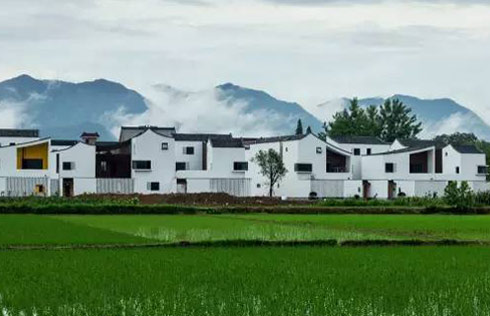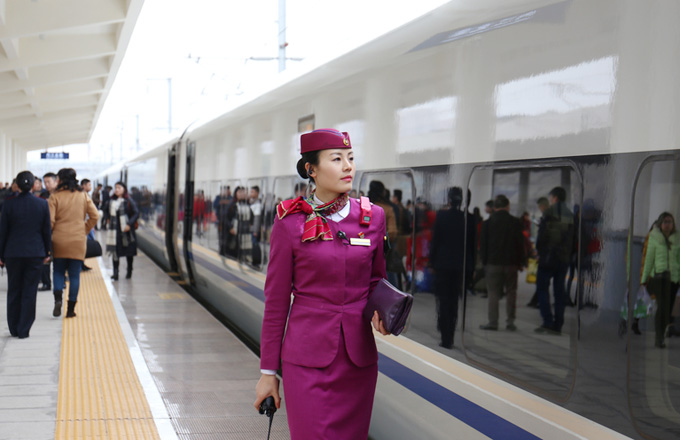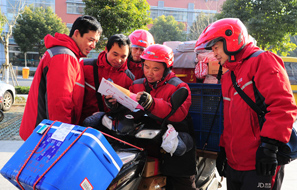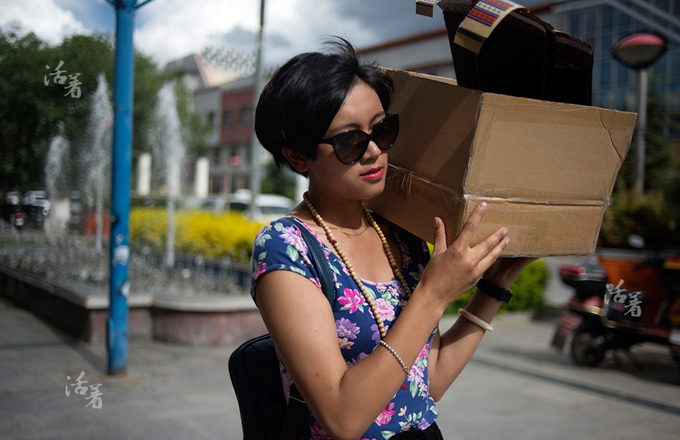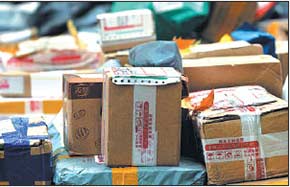Chinese school rebuilt with African aid
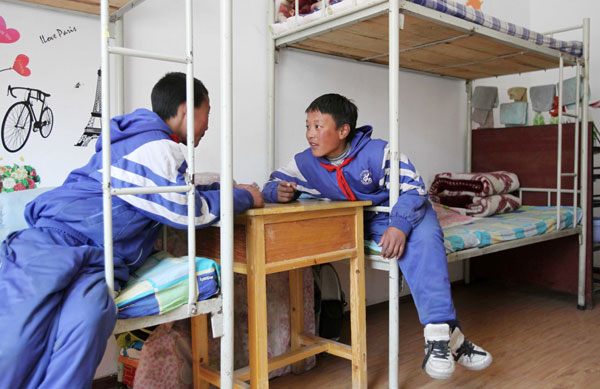 |
|
Two Tibetan students chat in a dorm at the China-Congo Friendship Primary School on March 15. Photos by Wang Jing / China Daily |
'Feels like home'
Because of the ongoing reconstruction work, the roads of the county seat of Chindu are rough and rugged, leaving pedestrians gasping for breath in the dust clouds raised by passing cars. However, just 4 kilometers to the west, the new China-Congo Friendship Primary School is surprisingly neat and clean.
In the dormitory, quilts and blankets were rolled up in orderly fashion on the beds, and toothbrushes and towels occupied the spotless shelves. At 12:40 pm, students stepped out of the classroom for lunch, the younger children at the front of the line.
They lined up to wash their hands before collecting - their food, meat and two types of vegetables - from the cafeteria. The students have been taught to be polite, so the younger kids receive their rations first. Some giggled nervously, overcome with shyness at the sight of strangers.
The reconstruction of 44 schools in Yushu, seven of them in Chindu, was completed at the end of last year. Freezing winter temperatures and the difficulties of working at high altitude restricted building work to just six months, according to local residents. Because the summer months offer the best working conditions, construction began in June 2011 and was completed 13 months later.
"The altitude means people from other areas cannot work on a construction site, and a shortage of local labor meant the construction work progressed at a slow pace," said Han Yonghong, director of the teaching and research office at the Chindu education bureau.
Han said the high price of labor resulted in the school costing much more than other projects in the region. Years ago, a skilled worker earned less than 100 yuan a day, but a surge in demand for workers has pushed up the price and many laborers charge more than 300 yuan for a day's work.
Chindu, though primarily a herding and agricultural area, has a good reputation for basic education. In the last decade, the county has been top of the six in the prefecture in terms of sending high school students to college, said Sodwang Nyima, director of the Chindu Bureau of Education.
Last year, the county spent 54 percent of its fiscal revenue of 7.8 million yuan on increasing teachers' salaries and improving facilities at the schools, according to the bureau. Principal Kunga said he is paid 7,000 yuan per month, more than double the wage of a primary school principal in neighboring Sichuan province.
The China-Congo Friendship Primary School was originally founded in 2004 when former county head Baisges Tashi visited the remote areas of Chindu and found that many orphans were not taken care of after school even though they were included in the compulsory education system. The county head raised the funds to build a school for orphans, and named it Wenle Primary School, which means "Gaining knowledge in pleasure".
Five years ago, Sonam Rinli's father was killed in a car accident, leaving his wife to raise four children on her own. Having received only a scant education, the 30-year-old widow resorted to laboring, carrying building materials on construction sites and earning just 20 yuan a day.
The experience made Sonam Rinli and his siblings acutely aware of the value of money: While their peers were able to pay 1 yuan to buy steamed bread for breakfast every day, the boys would make do with porridge and homemade pickles.
"Even though the compulsory education system didn't charge us, the 600 yuan my mother had to pay for our daily school expenses weighed on her so badly," said the boy.
Two years ago, he and his younger brothers transferred to the new school where they receive free education and a monthly subsidy of 185 yuan each, paid by the central government, to cover living expenses, relieving their mother of the burden.
A water shortage means many students are unable to wash themselves or their clothes regularly, so the school has arranged for the students to wash their hair and feet every Saturday afternoon, Jamyang said.
"Our job is to raise the students as if they were our own children. Many of the teachers give lectures in the classroom and then play the role of a parent after class," he said.
"It feels like home here. My dream is to enroll at a prestigious university and then find a satisfactory job. That will provide a comfortable life for my mother and allow me to donate to charity when I have the spare money," said Sonam Rinli.
Qin Zhongwei contributed to the story.
EDUCATION AWARENESS AMONG PARENTS RAISED
Chindu county has about 8,000 students studying at primary and middle schools. Compared with the situation years ago, parents now are starting to change their minds about sending their children to school, said Kunga Lodru, principal of Lab Ethnic School in Chindu county.
Lab Ethnic School has 220 students boarding there, more than 60 percent of enrollment, because of the long distance between the school and their homes. The distance made parents reluctant to send their children to the school. Rich families can pay for their children to ride in small vans running between villages and the township of Lab.
In late March, some yaks were spotted on the gray hills and mountains in the dry season. These were the only source of income for thousands of households in the Tibet-Qinghai Plateau. In addition to the cattle, Tibetan people dig in May for Chinese caterpillar fungus, which sells for 140,000 yuan ($22,500) per kg.
Ten years ago, 7- or 8-year-old children were considered capable of raising yaks, said Kunga. At around 6 am, kids drove the yaks to the hills and then got them back after 12 hours.
"Now many parents go to cities to work and earn much more than before. They know how important education can be in changing their lives and insist their children go to school," the principal said.
Tibetan people account for 20 percent of the 5.6 million people in Qinghai province. In areas inhabited by Tibetans, students have to learn two languages: Tibetan and Mandarin.
"At first, Mandarin was pretty hard for me and other students because the grammar is totally the reverse of the Tibetan language," said Sonam Rinli, 14, at the China-Congo Friendship Primary School.
After 18 years of hard work, Qinghai province has included all school-aged students into the nine-year compulsory education system, according to the local education department.
So far, 99.5 percent of the province's 510,000 kids who should enter primary schools are being instructed in schools and nearly 100 percent of 220,000 teenagers of middle school age receive an education. In 2011, the last 43 schools in six cities and prefectures passed the Ministry of Education's inspection of compulsory education.
-Hu Yongqi
- Win-win cooperation between China and Africa
- Guangdong's exports to Africa rise to $2.3b
- Mandarin makes its voice heard in South Africa
- Critics of China-Africa relations 'not objective'
- China, South Africa agree to boost ties
- New chapter for China-Africa relations
- China, S Africa to prioritize ties in foreign policies
- China's medical robots take on foreign rivals
- Zhejiang halts live poultry trade amid bird flu concerns
- Public security departments facilitate migrants' ID card renewal
- China plans 50 billion yuan of investment in rural methane projects
- 5.6-magnitude quake hits Taiwan; no casualties reported




